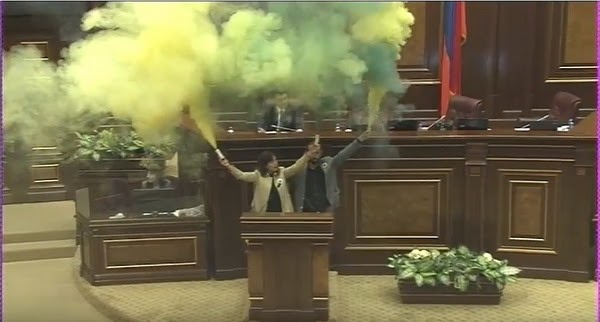By now, anything that had to be said about last week’s brawl on the floor of Armenia’s National Assembly has already been said. The sight of these grown men (yes, they were mostly men) engaging in a literal bench-clearing brawl in the most sacred chamber at the heart of Armenia’s democratic statehood would be pathetic under normal circumstances; but at a time when the country is still struggling with the worst global pandemic in a century, it’s a tragic blow to the crucial image of a united leadership which many Armenians rely on to help navigate this crisis.
But, since irony is wasted on the stupid, as the ever-perceptive Oscar Wilde once remarked, the date of the melee, May 8, coincides with the second anniversary of the Velvet Revolution. On that day in 2018, Edmon Marukyan led his Bright Armenia MPs into a coalition with their now-rival Civil Contract counterparts to form a government under the newly-elected Prime Minister Nikol Pashinyan.
While the question as to how Armenia’s two most prominent liberal-democratic parties went from trading votes to trading punches in the span of 24 months should be left to historians to resolve, political scientists may find the study into its lasting effects on the trajectory of Armenia’s parliamentary tradition much more captivating.
If last week’s free-for-all, which pitted Bright Armenia leader Edmon Marukyan against pro-government MP and Karabakh War veteran Sasun Mikaelyan, was shocking for its intensity, it was surprising to no one. This incident fits in Armenia’s recent political history at the tail end of a string of incrementally more boorish breeches of parliamentary decorum which so far include incessant trading of insults, sexually-charged verbal abuse towards a female MP, an actual street fight between the Deputy Parliamentary Speaker and a bearded man on the lunatic fringe straight out of the 1988 cult film They Live, and a general atmosphere of incivility unbefitting of a national parliament.
But there is a silver lining to this recent pandemic in parliamentary rumpus. And no, I’m not referring to the fact that if you slow down the video from the fight to half-speed it would pair perfectly with Giacomo Puccini’s Nessun dorma performed by Pavarotti (seriously, try it!). It’s also a sign that Parliament is working—poorly, but working nonetheless.

It should come as no surprise to astute observers of Armenian politics that the start of this uptick in parliamentary brouhaha coincides with Armenia’s 2015 transition towards a parliamentary system of government—or as those of us accustomed to Westminster-style systems would know it: Responsible government. That is to say that rather than report to a president, ministers are accountable to Parliament.
Until recently, Armenia’s political decision-making process was almost entirely in the hands of the executive branch. The National Assembly’s purpose was mostly to rubber stamp bills sent down from the President’s office and provide immunity from prosecution for government-connected oligarchs. That isn’t to say that the debate chamber wasn’t host to some impressive martial performances in its day. Such fights happened quite regularly; they just didn’t matter.
Yet the 2015 referendum altered the path of Armenia’s political landscape in ways which its self-serving architects could never have anticipated. Parliament mattered. Bills could be debated, stalled, filibustered or voted on. Committees could be chaired and podiums orated from. Despite the meticulously-outlined regulations designed to perpetuate the then-ruling regime’s hold on the legislature, its rostum now provided a soapbox which amplified the voices of even the smallest factions represented – that is, so long as they were represented. Such an opportunity was not lost on the likes of Pashinyan who so skillfully adapted it to his strength as an orator and adroitly maneuvered a constitutionally legitimate and bloodless transfer of power two years ago.
But Responsible Parliament requires responsible parliamentarians. The exhaustively long list of rules of order and decorum by which most parliaments in mature democracies abide by are the product of centuries of experimentation. 101 of the 132 MPs currently caucusing in the National Assembly, however, are freshmen—meaning they have no prior political experience whatsoever.
It should be noted that the legislative chambers of more mature democracies have likewise seen their share of intensive—even violent—debates over issues of policy. But breach of parliamentary ethics is taken equally seriously. Most Canadian readers might recall the extensive apology tour that Prime Minister Justin Trudeau was forced to endure following an incident involving an inadvertent elbowing of an opposition MP. The event has been forever immortalized with its own Wikipedia entry entitled “Elbowgate.”
In such circumstances, the behavior repeatedly displayed by Deputy Speaker Simonyan, opposition leader Marukyan and so many others would have necessitated immediate resignations had they occurred in Canada, or indeed, anywhere else. In fact, PM Pashinyan disappointingly missed an important opportunity to take a firm stand against the rapidly deteriorating decorum when he condemned the violence, but placed the blame squarely on the opposition. Accusations of subterfuge and collusion with the previous regime likely didn’t help either.
The members of the seventh convocation of Armenia’s National Assembly may as well be part of the first convocation, as they face a unique historical opportunity to break with the past and shape the future of Armenia’s parliamentary tradition for generations to come. Parliament should provide an inclusive platform for MPs to fulfill their obligation to voters by drafting, debating and disagreeing on legislation in an atmosphere of mutual respect and party discipline. The first step towards Responsible Parliament is to groom responsible parliamentarians. Might it be time to clean house?


Thank you Raffi for denouncing this disgrace.
What a shame ! Amot!
Seriously! What an embarrassment!
As an Armenia.-American living in Woodinville, Washington, I raised my daughter to be an active and proud Armenian. After seeing the uncivilized Parliamentary altercations she was very disappointed and had many unanswered question! Thank you for the informative article!